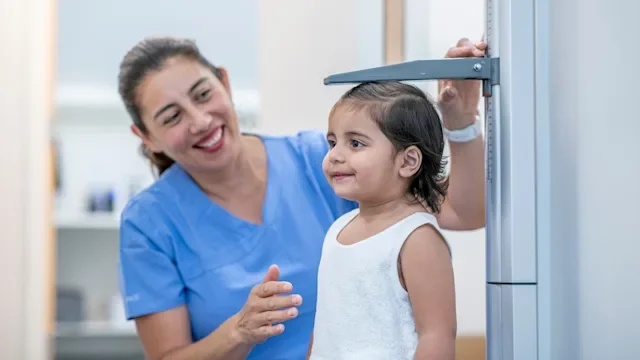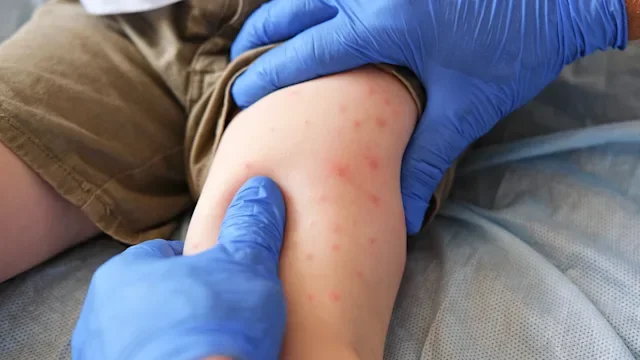Key takeaways:
Turner syndrome is a genetic condition that occurs when a female child inherits only one X chromosome (instead of two).
Children with Turner syndrome can develop certain medical conditions. Expert guidelines recommend screening for these conditions at specific ages.
If your child has Turner syndrome, it helps to connect with national organizations like the Turner Syndrome Society.
Turner syndrome is a genetic condition that affects 1 out of every 2,500 females. Children with Turner syndrome live long, productive lives. But the condition affects many organs in the body.
Not everyone with Turner syndrome has the same health experience or outcomes. But they do have a higher risk of developing certain medical conditions. So children and adults with Turner syndrome need specialized screening for medical conditions.
People with Turner syndrome have unique healthcare needs. Understanding these needs will help you be a strong advocate. And that will keep you (or your loved one) healthy.
Search and compare options
What causes Turner syndrome?
In general, people have 23 pairs of chromosomes. These chromosomes have genes that determine your unique characteristics.
The “sex chromosomes” are one of these pairs, and they determine your sex. Females usually inherit two X chromosomes. Males inherit one X and one Y chromosome. Females with Turner syndrome only inherit one complete X chromosome.
This occurs because of a random error in the cell division. It’s not due to anything the parents did or did not do.
How do you diagnose Turner syndrome?
The diagnosis of Turner syndrome uses a karyotype. This is a genetic blood test that maps out your chromosomes.
With prenatal genetic testing, many parents know about their child’s Turner syndrome before birth. But about ⅓ of people with Turner syndrome get a diagnosis after birth.
The 8 most important healthcare needs of people with Turner syndrome
Children and adults with Turner syndrome need the same health, dental, and eye care as everyone else. But due to the risk for other health conditions, they also need specialized healthcare screening and treatments.
Read more like this
Explore these related articles, suggested for readers like you.
Some centers have specialized teams that have a variety of healthcare professionals to meet these special needs.
1. Heart health
Almost half of children with Turner syndrome are born with congenital heart disease. At the time of diagnosis, a cardiologist should do a complete evaluation of your child. This includes an electrocardiogram (EKG) and echocardiogram. These studies look at the heart and large vessels. If there are concerns about the form of these structures, your child will need more treatment.
Children and adults with Turner syndrome should see a cardiologist at least once a year. This is important even if all the structures around and inside the heart are well formed. That’s because people with Turner syndrome can develop aortic dilation and high blood pressure.
Heart disease is the number one cause for early death in people with Turner syndrome. So it’s important to have regular cardiac evaluations.
2. Growth and puberty
Children and adults with Turner syndrome are shorter than most people. But growth hormone therapy lets them reach average adult heights. Experts recommend starting growth hormone therapy as soon as a child is smaller than the 5% on the typical (not Turner) growth curve. This usually happens between years 2 and 5. But it can happen sooner.
Once this happens, it’s time to see an endocrine specialist. They’ll follow your child’s growth and check their response to growth hormone therapy. An endocrinologist will also make sure your child goes through puberty. Most children with Turner syndrome do not start puberty on their own. Without a second X chromosome, they don’t make enough hormones to trigger puberty.
If this is the case for your child, they’ll use hormone therapy. Most children need this therapy long term. Hormone therapy helps with development as well as heart health, bone mass, and liver health. There’s even evidence that hormone therapy improves learning throughout adolescence and adulthood.
3. Fertility preservation
Almost everyone with Turner syndrome has ovarian failure. This is a type of infertility where the body does not make eggs, or the eggs don’t mature.
If your child still has part (or most) of their second X chromosome, they may have some viable eggs in their ovaries. In these cases, your healthcare team might recommend egg freezing during their teen years.
People with Turner syndrome who wish to become pregnant will need in vitro fertilization. They may be able to use their own eggs if they preserved them earlier. But in most cases they need third-party egg donation to have a baby.
4. ADHD
Children and adults with Turner syndrome have the same range of intelligence as everyone else. But they may be at higher risk for developing attention deficit-hyperactivity disorder (ADHD). Studies show that people can also have trouble with visual-spatial organization. They can also struggle with nonverbal problem solving (like math).
Children with Turner syndrome should have psychoeducational testing to look for learning differences. And their schools should make accommodations to meet their learning needs.
5. Hearing loss
Turner syndrome affects the development of the ear. Children are at risk for frequent ear infections and chronic middle ear fluid. Over time, these conditions can scar the eardrum and cause conductive hearing loss. Studies also show that 50% of adults develop sensorineural hearing loss.
Children and adults should have hearing tests every 3 to 5 years. If there are concerns for hearing loss, your child may need ear tubes. Adults may also need hearing aids.
6. Kidney health
Turner syndrome affects the blood supply to the kidneys and how they develop. About 30% to 40% of people with Turner syndrome have a kidney that did not form properly. This can increase the risk for urinary tract infections, kidney disease, and high blood pressure.
Everyone with Turner syndrome needs an ultrasound to look at the kidneys at the time of diagnosis. If there are concerns about your child’s kidneys, they may need specialized treatment.
7. Autoimmune conditions
Experts are not sure why, but Turner syndrome makes you twice as likely to develop certain autoimmune conditions, like:
Children and adults with Turner syndrome need regular blood tests to look for signs of these conditions. If any of these develop, your child will need further treatment.
8. Vision screening
Turner syndrome increases the risk of developing strabismus and amblyopia. These conditions can permanently affect vision. Children with Turner syndrome need a full eye exam at the time of their diagnosis and every 3 years throughout their lives. This will pick up signs of amblyopia so they can start treatment early.
What resources are available for individuals and their families?
People with Turner syndrome have a lot of specialized healthcare needs. This can be overwhelming at first, especially if you don’t know where to turn for help. Having a knowledgeable healthcare team to support you and your family is crucial. But it’s also important to build a community around your family.
There are many organizations that can help you connect with medical specialists and other families. Visit the Turner Syndrome Society and the Pediatric Endocrine Society to learn more about national and local community groups and organizations that can help you on your journey.
The bottom line
Turner syndrome is a genetic condition where a female inherits one X chromosome instead of two. People with Turner syndrome have unique healthcare needs. An experienced healthcare team can make sure your child gets the screening and support they need. It’s also helpful to connect with other families and community groups. Resources like the Turner Syndrome Society can help.

Why trust our experts?


References
Bilge, I., et al. (2000). Frequency of renal malformations in Turner syndrome: Analysis of 82 Turkish children. Pediatric Nephrology.
Bondy, C. A. (2007). Care of girls and women with Turner syndrome: A guideline of the Turner Syndrome Study Group. Journal of Clinical Endocrinology and Metabolism.
Davenport, M. L., et al. (2010). Growth hormone treatment does not affect incidences of middle ear disease or hearing loss in infants and toddlers with Turner syndrome. Hormone Research in Paediatrics.
Elsheikh, M., et al. (2001). Hormone replacement therapy may improve hepatic function in women with Turner's syndrome. Clinical Endocrinology.
Frías, J. L., et al. (2003). Health supervision for children with Turner syndrome. Pediatrics.
Gravholt, C. H., et al. (2017). Clinical practice guidelines for the care of girls and women with Turner syndrome: Proceedings from the 2016 Cincinnati International Turner Syndrome Meeting. European Journal of Endocrinology.
Hultcrantz, M., et al. (1997). Turner's syndrome and hearing disorders in women aged 16-34. Hearing Research.
Klein, K. O., et al. (2018). Estrogen replacement in Turner syndrome: Literature review and practical considerations. Journal of Clinical Endocrinology and Metabolism.
Ostberg, J. E., et al. (2005). Vasculopathy in Turner syndrome: Arterial dilatation and intimal thickening without endothelial dysfunction. Journal of Clinical Endocrinology and Metabolism.
Pediatric Endocrine Society. (2018). Turner syndrome.
Ross, J. L., et al. (1998). Effects of estrogen on nonverbal processing speed and motor function in girls with Turner's syndrome. Journal of Clinical Endocrinology and Metabolism.
Ross, J. L., et al. (2000). Use of estrogen in young girls with Turner syndrome: Effects on memory. Neurology.
Silberbach, M., et al. (2018). Cardiovascular health in Turner syndrome: A scientific statement from the American Heart Association. Circulation: Genomic and Precision Medicine.
Turner Syndrome Society of the United States. (n.d.). Resources for individuals and families.















